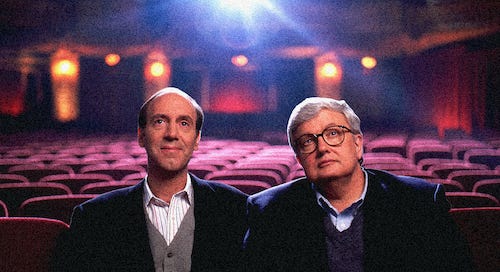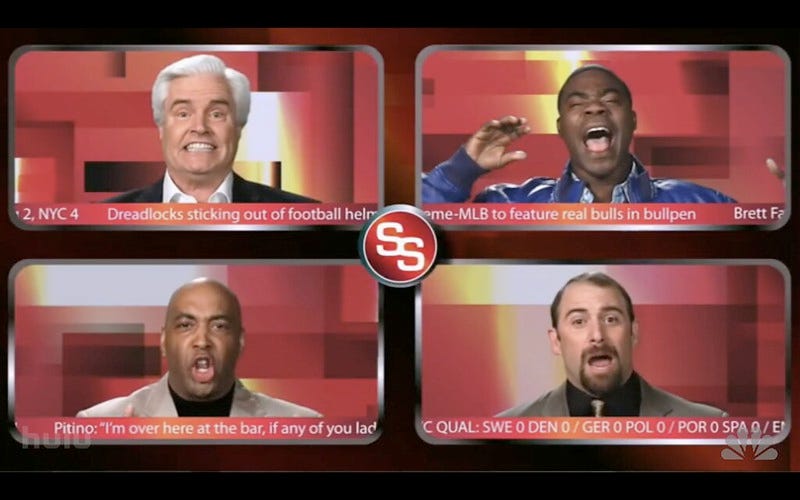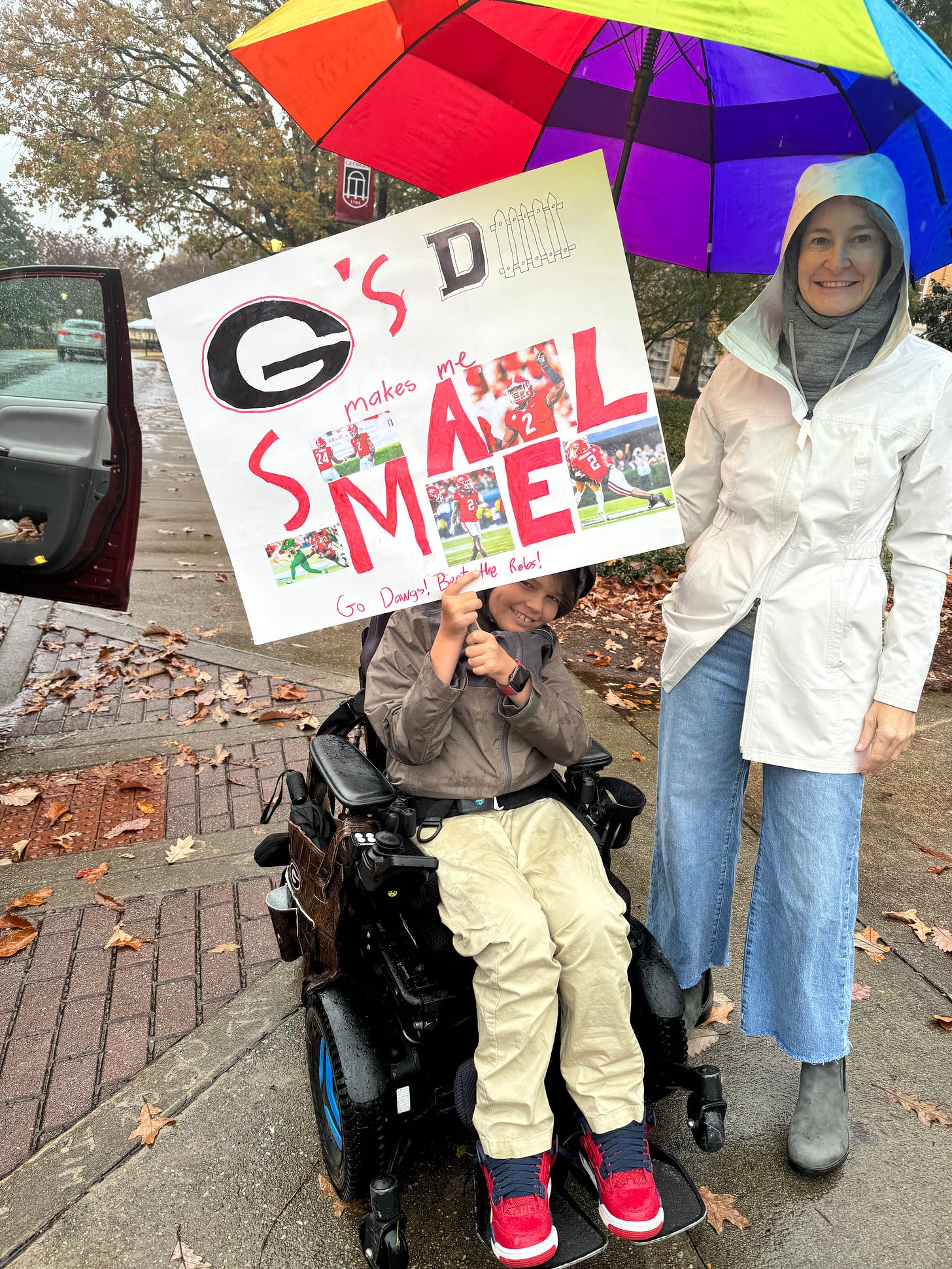Here is a button where you can subscribe to this newsletter now, if you have not previously done so. I do hope that you enjoy it.
This week, we had Matt Singer on the Grierson & Leitch podcast. I’ve been a fan of Matt’s for a long time—I used to obsessively listen to the IFC and Filmspotting podcasts he hosted with my Vulture colleague Alison Wilmore—and he now writes regularly and excellently for Screencrush. But we talked to him about his new book, Opposable Thumbs: How Siskel & Ebert Changed Movies Forever, which, it must be said, is a book so specifically directed at my own interests that at one point I asked Matt if he wrote it directly for me.
The book is a fantastic read even if you’re not a Siskel & Ebert obsessive like me—it’s a wonderful biography of both men, a terrific reminder of some wonderful movies you might have forgotten about and, in the end, even a bit of a tearjerker as both men fall ill—but it will be absolute manna for anyone who religiously watched “Siskel & Ebert” like I did growing up. It was on at 5:30 every Saturday on WAND-TV Decatur and appointment television every week: I used to go over to Grierson’s to watch it before we would go out on Saturday nights in high school. (And by “go out,” I mean “go to the movie theater,” not “go meet girls,” obviously.) Ebert was my role model and, briefly, my mentor, and it all started from watching him and Siskel on that show. Here was a dopey schlub from Central Illinois, like me, going on television and talking to the entire planet every week about something he loved passionately and understood deeply. He made me think there was a world outside Mattoon, Illinois, and that maybe, if I worked hard like he did (and went to the University of Illinois and studied journalism like he did), I could be a part of it.
And it really is worth remembering just how big a deal Siskel & Ebert were, something the book reminds you of constantly. I mean, these guys were regulars on Letterman … and, in one of my favorites bits ever, went around visiting random people in New Jersey with Dave. Did you know that Gene can name all the helping verbs? Or that Roger can help with your gutters?
They even once had an entire episode of “Saturday Night Live” that revolved around them.
But I’d argue what the book does that’s most important is that it reminds us that “Siskel & Ebert,” before it was anything else, was a very smart show. This was not a program that featured Mario Lopez complimenting celebrities’ tans, or otherwise aimed for the lowest common denominator. “Siskel & Ebert” simply featured just two untelegenic guys sitting in chairs and talking to each other. But it became a hit. And it became a hit because it never once talked down to its audience, and because it focused exclusively on what it thought was important—what people needed to know about. Ebert often wrote that he considered his job simply one of journalism, that he was just a guy on the movie beat, and the show reflects that: Two intelligent reporters who have their beat down cold and, and this is key, love that beat—and want you to love it too. This was a nationally syndicated show, one you could watch in South Dakota and Louisiana and Alaska, that would spend half an hour talking about obscure Swedish films and not apologize for it one whit.
Oh, and it helped that they could be very, very funny.
There is a moment in the book when Siskel and Ebert have one of their biggest arguments, when Siskel gave away the “secret” of the 1992 film The Crying Game, infuriating Ebert. And it legitimately infuriated him: He howled at Siskel, calling him “arrogant,” to the point that the feud made national news and led to a classic Siskel joke when he, when asked whether the confrontation was in danger of getting physical, said, “That is not possible. There's not enough motor coordination." But imagine that: Two middle-aged, goofy looking guys from the Midwest, getting riled up enough in a discussion about an independent Irish movie about a soldier falling in love with a transgender singer that the Associated Press wrote about it. That a half hour national program would focus on such a movie in 1992 is incredible enough; that it would inspire a national conversation is truly remarkable.
The central argument Singer makes in the book is that if you were wanting to produce an entire generation of people who loved movies, if you wanted to inspire random people from New Jersey and Utah and Central Illinois, places where the most interesting and adventurous movies otherwise would never be seen or even heard of, to fall in love with movies and art and intellectual rigor, “Siskel & Ebert” was the perfect way to do it. He became a movie lover because of them, so did Grierson and I, and so did hundreds of thousands of other people. We didn’t love the show, and thus fall in love with movies (and thus the world), because there was some sort of central gimmick, or because there was some viral trick pulled to grab our attention, or because the show dumbed itself down to reach the widest possible audience. We loved the show because it respected its audience too much to do any of that. It was honest and pure and straightforward. It dared to be intelligent. It dared to simply be itself.
And I have to tell you: That there is nothing like it on television—on any topic, from movies to sports to music to politics—more than 30 years later is an indictment of television, of popular culture, and really of all of us.
It is, after all, an extremely repeatable format. (Grierson and I basically ape the exact format every week on the podcast, albeit with, uh, fewer time constraints.) “Crossfire” was the political version of the show, before it collapsed into the kayfabe chaos that everything else in politics collapsed into. “Pardon the Interruption” was the sports version, and it worked for a while, but as its hosts grew more and more famous, and as other shows attempted to mimic its success, it devolved into weird point systems, desperate hot takes, host self-aggrandizement and, of course, so much sports shouting.
There have been good-faith attempts at this basic notion of having two intelligent people talk about topics that they love for a wide audience: The closest I think anybody came was probably ESPN’s “High Noon” with Bomani Jones and Pablo Torre, but that show was never really given any time to get going and was at the mercy of network execs who don’t have any vision beyond “is this number currently bigger than that number?” anyway. Remember, “Siskel & Ebert” began as a program on Chicago’s PBS station, which allowed it to be smart from the beginning; by the time it got to syndication, everybody knew what they were getting. But, as the book makes clear, this was also at a time when the people who ran television networks were creative people, people who saw “Siskel & Ebert” and thought, “this is good, we have to show this to people” rather than “can we make the people on this show more attractive, and can we add some buzzers and points, and can we have them debate the dumbest possible topics instead of the things they actually care about?” When you only care about the short-term, you never invest in anything other than what will allow to keep your job. Which has nothing to do with the audience, or talent, or intelligence, at all.
And thus: There can be no more shows like “Siskel & Ebert.” Trusting in the intelligence of an audience—even a niche audience, enough to turn a small profit rather than everything constantly having to scale huge—is for people who actually care about movies, or sports, or public policy … and those people are not the people who have power anymore. In this way, this is not entirely different than what has happened to the Internet over the last 20 years: We’ve put the most banal, if-the-numbers-go-up-I-get-a-pellet people in charge, which incentivizes them to make the dumbest, easiest possible decisions rather than getting behind something that could inspire people who might someday actually make up the future of their business. And thus on and on it goes, dumb stuff begetting other dumb stuff, with a whole generation of people not realizing it could be any other possible way. In 1980, and 2005, you could say, “trust me, these guys are good, people will find this and love it.” Now anyone who would even dare to make a bet like that aren’t allowed in the room.
Reading the book, and talking to Matt, made me nostalgic for “Siskel & Ebert.” But really: It made me nostalgic for when people trusted adults to talk to other adults like they were adults—when it was not just OK to be smart and honest on television and on the Internet, but encouraged, even demanded. It feels like a lot longer ago than it really is.
Here is a numerical breakdown of all the things I wrote this week, in order of what I believe to be their quality.
My Interview with Max Marshall, Author of “Among the Bros,” New York. This is an excellent book, out this week, and you should buy it.
The Victor Wembanyama Era Is Here, New York. And it’s spectacular.
I Wrote Up Our First Offseason Power Rankings, MLB.com. It’s correct, but still disturbing, seeing the Cardinals so far down there.
PODCASTS
Grierson & Leitch, we discussed “Priscilla,” “Nyad” and “Fingernails.” We also talked to Matt Singer about his fantastic book about Siskel & Evert, “Opposable Thumbs.”
Waitin' Since Last Saturday, we reviewed the Missouri game and previewed the Mississippi game. (With special guest star William!)
LONG STORY YOU SHOULD READ THIS MORNING … OF THE WEEK
(Repeating from last week because I forget to include the link in the original email.)
“The 50 Funniest Moments in Airplane,” Tim Grierson, Cracked. Grierson talking to the ZAZ folks about one of the funniest movies of all time, it’s just great.
ONGOING LETTER-WRITING PROJECT!
This is your reminder that if you write me a letter and put it in the mail, I will respond to it with a letter of my own, and send that letter right to you! It really happens! Hundreds of satisfied customers!
Write me at:
Will Leitch
P.O. Box 48
Athens GA 30603
CURRENTLY LISTENING TO
“Can’t You Hear Me Knocking,” The Rolling Stones. Been listening to the new Rolling Stones album and it’s, well, it’s fine, I’m glad they’re making music, good for them. But it has me listening to listening the Stones a ton. I do love this song. And my god is it used to such great effect in Casino.
Remember to listen to The Official Will Leitch Newsletter Spotify Playlist, featuring every song ever mentioned in this section.
Also, now there is an Official The Time Has Come Spotify Playlist.
It’s a rainy gameday in Athens, but we’re out there with our signs nevertheless.
Have a great weekend, all …
Best,
Will








I read your college drugs article the other day in New York Magazine (the main reason I subscribe-you are there!) and it was a shock to see your byline on a non sports story. I brushed away my trepidation and plowed in. It was very well written, very powerful! One thing I will note as a Father: the time to guide them properly is when they're young.
At 18 it's too late. Discuss everything (boundaries, dangers, grifters, etc.) They may roll their eyes "oh Dad" but it will sink in.
The most important thing: pay attention and give attention. All those activities with your sons?
It shows them they matter. You are doing well grasshopper.....
LOVE IT (talking like on the newer shows) :).